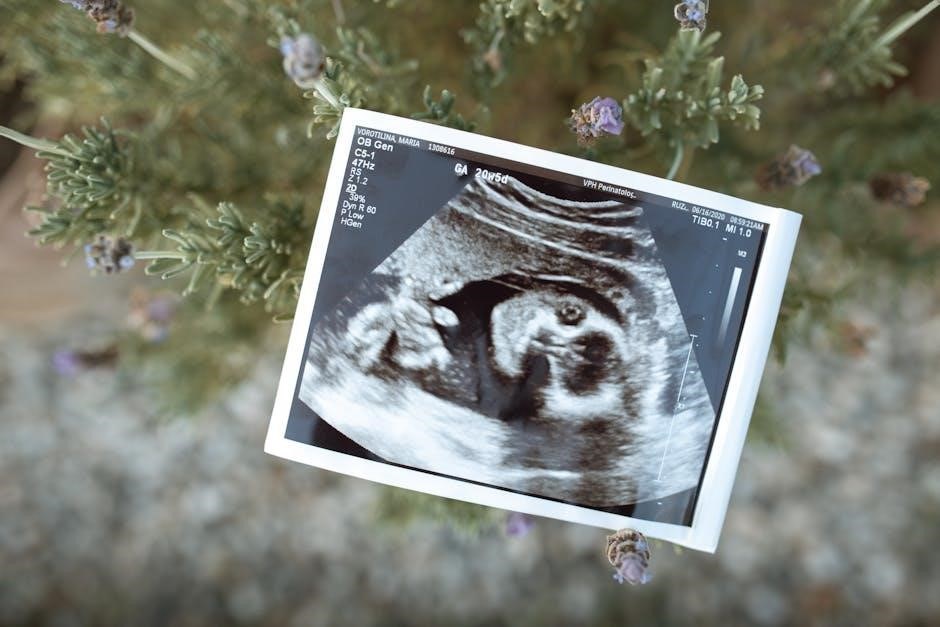
the complete australian guide to pregnancy and birth
This empowering guide provides comprehensive, evidence-based insights into pregnancy, birth, and early motherhood in Australia, offering practical advice and emotional support for expectant mothers and families.
Overview of the Guide and Its Importance
The Complete Australian Guide to Pregnancy and Birth is a trusted, evidence-based resource tailored for Australian mothers. It offers comprehensive insights into pregnancy, labour, and early parenthood, combining expert advice from doctors, midwives, and health specialists. The guide’s importance lies in its ability to empower families with relevant, up-to-date information, ensuring they feel informed and confident throughout their journey. Its focus on Australian-specific healthcare practices and emotional support makes it an invaluable companion for modern mothers.
What to Expect: From Pre-Conception to Postpartum
This guide seamlessly navigates readers through pre-conception planning, pregnancy trimesters, labour, birth, and postpartum care. It provides a clear timeline of physical and emotional changes, while addressing key milestones and decisions. From understanding fertility to postpartum recovery, the guide ensures mothers are well-prepared for every stage. It emphasizes informed decision-making and offers practical advice, making it an essential resource for a holistic and empowered journey into parenthood.
Pre-Conception Planning
Pre-conception planning involves health checks, lifestyle adjustments, and vaccinations to ensure a healthy pregnancy. It also addresses emotional and financial readiness for parenthood.
Health Checks and Preparing Your Body for Pregnancy
Essential health checks before pregnancy ensure a healthy start. Vaccinations, such as whooping cough, are recommended to protect both mother and baby. Consulting a GP for immunisation status and medical screenings is crucial. Preparing your body involves maintaining a balanced diet, staying physically active, and avoiding harmful substances. Addressing pre-existing health conditions and managing weight also play key roles in optimizing pregnancy outcomes. Early planning ensures a safer and healthier journey for expectant mothers in Australia.
Lifestyle Factors to Consider Before Conception
Lifestyle choices play a crucial role in preparing for pregnancy. Maintaining a healthy diet, exercising regularly, and managing stress are vital. Avoiding alcohol, smoking, and recreational drugs is essential to ensure a safe pregnancy. Mental health should also be prioritized, with mindfulness practices and emotional support systems in place. Creating a nurturing environment and staying informed through resources like the Pregnancy, Birth, and Baby service can empower prospective parents for a positive journey.
Financial and Emotional Preparation for Parenthood
Preparing financially and emotionally is essential for a smooth transition into parenthood. Budgeting for prenatal care, baby supplies, and potential leave from work is crucial. Emotional readiness involves addressing mental health, strengthening relationships, and building a support network. Understanding government support and parental leave entitlements can alleviate financial stress. Prioritizing emotional well-being ensures a resilient foundation for navigating the challenges and joys of parenthood effectively.

Understanding Pregnancy Trimesters
Pregnancy is divided into three trimesters, each marking significant milestones in fetal development and maternal health. This section explores the physical and emotional changes during each phase.
First Trimester: Key Milestones and Concerns
The first trimester, spanning weeks 1 to 12, is a critical period of rapid fetal development. Key milestones include implantation, organ formation, and the first heartbeat. Concerns may arise with morning sickness and fatigue. Vaccinations, like whooping cough, are recommended for protection. Emotional adjustments and lifestyle changes are common. It’s essential to avoid alcohol and consult healthcare providers for any worries. This period lays the foundation for a healthy pregnancy, making it a time of wonder and preparation.
Second Trimester: Growth and Development
The second trimester, spanning weeks 13 to 26, is marked by significant fetal growth and development. The baby’s organs mature, and senses like hearing and vision begin to function. Mothers often experience relief from morning sickness, with energy levels improving. Physical changes, such as a visible belly andstretch marks, are common. This period is crucial for monitoring fetal growth and preparing emotionally for parenthood. Regular check-ups ensure both mother and baby’s health, fostering a sense of readiness for the journey ahead.
Third Trimester: Final Preparations for Birth
The third trimester, spanning weeks 28 to birth, focuses on final preparations for parenthood. The baby gains weight, organs mature, and they move into position for birth. Mothers may experience Braxton Hicks contractions, back pain, and nesting instincts. This period is crucial for creating a birth plan, attending antenatal classes, and emotionally preparing for the transition to parenthood; Regular medical check-ups ensure both mother and baby are ready for a safe and positive birthing experience, supported by a strong care system in Australia.

Prenatal Care in Australia
Australia offers a structured prenatal care system, ensuring regular check-ups, essential screenings, and tailored support for expectant mothers, fostering a safe and informed pregnancy experience nationwide.
Antenatal Classes and Education
Antenatal classes in Australia provide expectant parents with valuable insights into pregnancy, labour, and postpartum care. These classes cover topics such as birth plans, breastfeeding, and newborn care, ensuring families feel prepared. The Complete Australian Guide to Pregnancy and Birth complements this education, offering detailed, evidence-based information tailored to Australian healthcare standards. By combining practical advice with real-life experiences, these resources empower parents to make informed decisions, fostering confidence and readiness for parenthood.
Medical Screenings and Tests During Pregnancy
Regular medical screenings and tests are crucial during pregnancy to monitor maternal and fetal health. In Australia, expectant mothers receive recommended vaccinations, such as the whooping cough vaccine at 20-32 weeks, to protect against infections. Blood tests, ultrasounds, and other screenings are conducted to detect potential complications early. These tests ensure timely interventions, safeguarding both mother and baby. The Complete Australian Guide to Pregnancy and Birth provides detailed insights into these essential checks, reassuring families with evidence-based guidance.
Mental Health Support for Expectant Mothers
Pregnancy can bring emotional challenges, making mental health support essential. The Complete Australian Guide to Pregnancy and Birth emphasizes the importance of accessing resources like counseling and support groups. Organizations such as Beyond Blue and PANDA offer tailored assistance for expectant mothers. Prioritizing mental well-being ensures a healthier pregnancy and postpartum experience, fostering resilience and emotional stability for mothers and their families.

Staying Healthy During Pregnancy
Maintaining physical and mental well-being is crucial during pregnancy. Regular check-ups, balanced nutrition, and moderate exercise help ensure a healthy journey for both mother and baby.
Nutrition and Diet: What to Eat and Avoid
A balanced diet rich in essential nutrients supports maternal and fetal health. Focus on whole grains, lean proteins, fruits, vegetables, and healthy fats. Include folate, iron, and calcium-rich foods like leafy greens and dairy. Omega-3s from fish aid fetal brain development. Avoid high-mercury fish, undercooked meats, and excessive caffeine. Limit processed foods and sugary snacks. Proper hydration is key. A well-planned diet ensures optimal health for both mother and baby throughout pregnancy.
Exercise and Physical Activity Guidelines
Staying active during pregnancy supports physical and mental well-being. Opt for low-impact exercises like swimming, walking, and prenatal yoga. Avoid contact sports, high-impact activities, and exercises that risk falling. Listen to your body and modify routines as needed. Pelvic floor exercises strengthen core muscles, aiding in pregnancy and postpartum recovery. Always consult your healthcare provider before starting or continuing an exercise program during pregnancy to ensure safety and suitability for your individual circumstances.
Managing Common Discomforts and Symptoms
Pregnancy often brings discomforts like back pain, nausea, and fatigue. Stay hydrated, practice good posture, and use heat or cold packs for relief. Gentle stretching and prenatal massages can help alleviate muscle tension. For morning sickness, opt for small, frequent meals and avoid strong smells. Rest when needed, but avoid overexertion. If symptoms persist or worsen, consult your healthcare provider for personalized advice and support to ensure a comfortable pregnancy journey.
Labor and Birth Options
Explore various labor and birth options, including hospital, birth center, and home births, tailored to your preferences and medical needs for a personalized experience.
Creating a Birth Plan: What You Need to Know
A birth plan is a document outlining your preferences for labor and delivery, ensuring your voice is heard. It covers choices like birth location, medical interventions, pain management, and support people. While flexible, it guides healthcare providers in respecting your wishes. The Complete Australian Guide to Pregnancy and Birth offers detailed advice on crafting a realistic and personalized plan, emphasizing communication with your healthcare team to align expectations with medical possibilities.
Types of Deliveries: Vaginal, Cesarean, and Assisted Births
Vaginal delivery is the most common and natural birth process, allowing mothers to experience labor and push their baby out. Cesarean delivery, involving surgery, is often recommended for medical complications or fetal distress. Assisted births use tools like forceps or vacuum extractors to aid difficult vaginal deliveries. Each method has unique benefits and considerations, and healthcare providers work with mothers to determine the safest and most appropriate approach based on individual circumstances and medical needs.
Pain Management Options During Labor
Labor pain management options vary, allowing women to tailor their experience. Natural methods include breathing techniques, hydrotherapy, and massage, while medical options like epidural anesthesia, opioid injections, and nitrous oxide are widely used. Each method has benefits and considerations, and healthcare providers collaborate with mothers to choose the most suitable approach, ensuring both comfort and safety during the birthing process. The guide explores these options in detail, helping mothers make informed decisions.

The Postpartum Period
The postpartum period focuses on healing, emotional adjustment, and newborn care, emphasizing recovery, bonding, and establishing routines with support for new parents.
Physical Recovery After Birth
Physical recovery after birth focuses on healing, restoring strength, and managing postpartum discomforts. Mothers should prioritize rest, hydration, and nutritious meals to support their body’s recovery. Common challenges include soreness, swelling, and fatigue, which can be managed with medical guidance and self-care practices. It’s essential to follow healthcare providers’ advice for postpartum check-ups and wound care. Practical tips like using supportive clothing and gentle exercises can aid in a smooth recovery, ensuring mothers regain their physical well-being gradually and safely.
Emotional Well-Being: Navigating the Fourth Trimester
Navigating the fourth trimester involves addressing emotional challenges and fostering mental well-being. New mothers often experience hormonal shifts, sleep deprivation, and lifestyle adjustments, which can lead to feelings of overwhelm or anxiety. Building a strong support network, including partners, family, and friends, is crucial. Professional guidance from counselors or support groups can also provide relief. Prioritizing self-care, such as moments of solitude or engaging in calming activities, helps balance emotional health during this transitional period.
Essential Care for Your Newborn
Providing essential care for your newborn involves ensuring their basic needs are met with love, attention, and proper hygiene. Immunizations, such as the whooping cough vaccine, are crucial for protection. Feeding, whether breastfeeding or formula, should be tailored to your baby’s needs, with lactation support available if needed. Safe sleep practices, like placing your baby on their back, are vital for preventing SIDS. Regular check-ups with your healthcare provider will monitor growth and address any concerns, ensuring your newborn thrives in their first months of life.

Breastfeeding: Getting Started
Breastfeeding is a natural and nurturing process, supported by lactation consultants. Proper latching and frequent feedings are key to establishing a successful breastfeeding routine for your newborn.
Benefits and Challenges of Breastfeeding
Breastfeeding offers numerous health benefits for both mother and baby, including enhanced immune protection, nutrient-rich milk, and skin-to-skin bonding. It also supports uterine contractions and weight loss postpartum. However, challenges like nipple soreness, latching difficulties, and societal stigma can arise. Australian lactation consultants provide invaluable support to overcome these obstacles, ensuring a positive breastfeeding experience for new mothers navigating this natural yet sometimes complex process.
Overcoming Common Breastfeeding Difficulties
Many mothers face challenges like latching issues, nipple soreness, or milk supply concerns. Seeking guidance from lactation consultants and employing techniques like proper positioning can alleviate these difficulties. Ensuring frequent, effective feedings and maintaining a healthy diet supports milk production. Emotional support and reassurance are also vital, as stress and anxiety can impact breastfeeding success. With patience and professional advice, most mothers overcome initial hurdles, fostering a rewarding breastfeeding experience for both themselves and their babies.

Parenting Essentials
The Complete Australian Guide to Pregnancy and Birth offers practical advice and emotional support, helping new parents navigate care, bonding, and establishing routines for their baby.
Bonding with Your Baby: Tips for New Parents
Bonding with your baby is a beautiful journey that starts from the first moments of life. Skin-to-skin contact, eye gaze, and gentle touch foster deep emotional connections. Responding to your baby’s cues, such as cooing or crying, helps build trust and security. Engage in activities like breastfeeding, bath time, or reading to create meaningful moments. Fathers or partners can also bond through cuddling, play, or simply being present. These early interactions lay the foundation for a lifelong, loving relationship.
Sleep and Routine: Establishing a New Normal
Establishing a sleep routine is crucial for both baby and parents. Consistency in bedtime and wake-up times helps regulate your baby’s internal clock. Create a calming pre-sleep routine, such as a warm bath or gentle massage, to signal it’s time to rest. Be flexible, as newborns’ needs vary. Ensure a safe sleep environment, following Australian guidelines for cot safety. Remember, rest is essential for your well-being too—take naps when your baby does to recharge.
Building a Support System for New Parents
Building a strong support system is vital for new parents. Surround yourself with family, friends, and community networks who can offer emotional and practical help. Professional support, such as midwives, lactation consultants, and mental health specialists, can also provide guidance. Join local parent groups or online forums to connect with others sharing similar experiences. Don’t hesitate to ask for help—having a support system can greatly ease the transition into parenthood and provide a sense of community and understanding.
The Complete Australian Guide to Pregnancy and Birth empowers mothers with comprehensive insights, fostering informed decisions and positive experiences throughout their journey from pregnancy to motherhood.
Final Thoughts: Empowering Mothers for a Positive Experience
The Complete Australian Guide to Pregnancy and Birth equips mothers with evidence-based knowledge, fostering confidence and empowerment. By addressing physical, emotional, and practical aspects, it ensures a supportive journey from conception to early motherhood, helping families make informed decisions and embrace parenthood with clarity and joy.
Resources for Ongoing Support and Information
For continued guidance, The Complete Australian Guide to Pregnancy and Birth recommends trusted resources like Healthdirect and the Australian Government’s Pregnancy, Birth and Baby service. These platforms offer evidence-based information, practical tools, and access to local support networks. Additionally, joining parenting communities and attending postnatal workshops can provide emotional and practical assistance, ensuring families feel supported every step of the way.